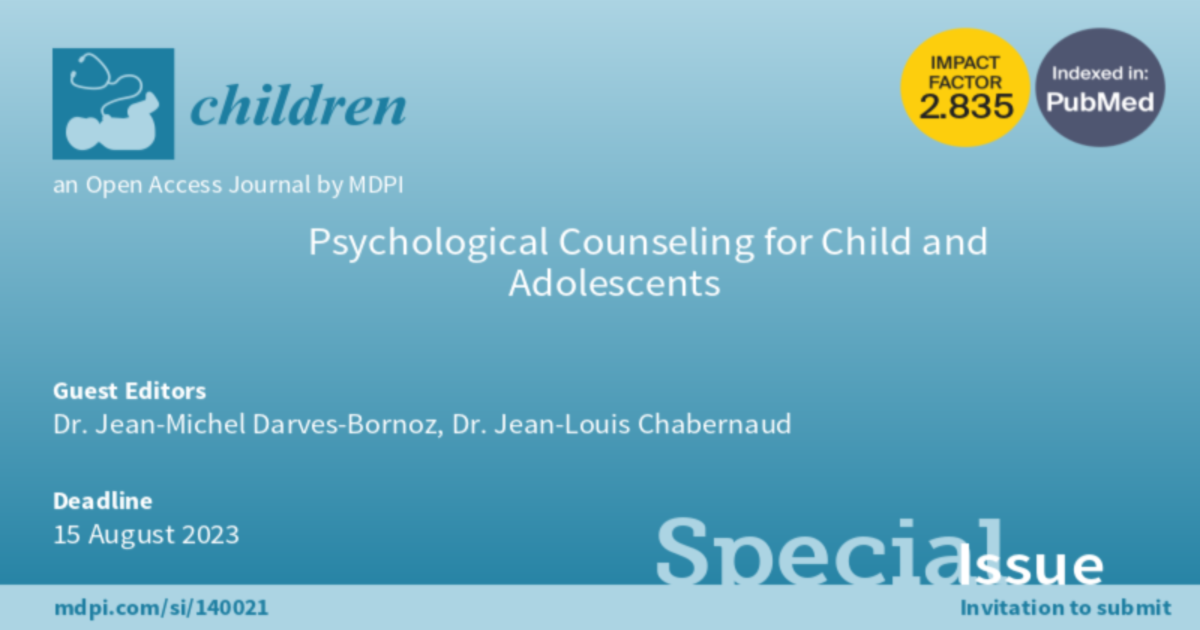Psychological Counseling for Children and Adolescents
A special issue of Children (ISSN 2227-9067). This special issue belongs to the section "Pediatric Mental Health".
Deadline for manuscript submissions: closed (15 August 2023) | Viewed by 2263

Special Issue Editors
Interests: trauma; epidemiology; somatization; mentalization; psychotherapy
Interests: neonates; infants; children; family centered care; emergency transportation
Special Issue Information
Dear Colleagues,
Unlike therapies in physical medicine, psychological therapy cannot result from diagnoses and therapeutic interventions based on biological, anatomopathological or pharmacological evidence of causality. Regarding the current classification of mental disorders, all diagnoses are given by humans based on exclusively clinical observations. The interventions use psychological approaches developed from a philosophical corpus and are still closely linked to it.
As a physical counter-example, let us consider that everywhere in Europe (and perhaps also worldwide), the way that an oncologist would react to breast cancer would be relatively unified, but on the contrary, psychological counselling for children and adolescents strongly differs between professionals. That is why today it is still too early to have a unique, well-documented and well-proven procedure; it seems better at this stage to let diverse research explain different researchers’ experiences.
When brief psychological counselling is given for a patient or their relatives, its effect often quickly fades. Fluctuations in self-esteem or poor mentalization regularly lead to failure of the intervention. Mentalization, meaning difficulties in identifying the ideas and affects that are present in our minds and the minds of others, is primarily a psychoanalytic concept. Improving mentalization improves psychological counselling in still-unstable identities.
Therefore, we suggest collecting in this Special Issue, without a priori unification, texts from all experts in childhood and adolescence (physicians, pediatricians, psychiatrists, psychologists, and epidemiologists, but also psychoanalysis, psychosomatics, sociology, law and ethics specialists as well as social workers) centered on the design of their practice regarding a pathology (physical or psychological) or regarding an interventional technique (for patients or their relatives).
Dr. Jean-Michel Darves-Bornoz
Dr. Jean-Louis Chabernaud
Guest Editors
Manuscript Submission Information
Manuscripts should be submitted online at www.mdpi.com by registering and logging in to this website. Once you are registered, click here to go to the submission form. Manuscripts can be submitted until the deadline. All submissions that pass pre-check are peer-reviewed. Accepted papers will be published continuously in the journal (as soon as accepted) and will be listed together on the special issue website. Research articles, review articles as well as short communications are invited. For planned papers, a title and short abstract (about 100 words) can be sent to the Editorial Office for announcement on this website.
Submitted manuscripts should not have been published previously, nor be under consideration for publication elsewhere (except conference proceedings papers). All manuscripts are thoroughly refereed through a single-blind peer-review process. A guide for authors and other relevant information for submission of manuscripts is available on the Instructions for Authors page. Children is an international peer-reviewed open access monthly journal published by MDPI.
Please visit the Instructions for Authors page before submitting a manuscript. The Article Processing Charge (APC) for publication in this open access journal is 2400 CHF (Swiss Francs). Submitted papers should be well formatted and use good English. Authors may use MDPI's English editing service prior to publication or during author revisions.
Keywords
- psychotherapy
- behavior
- emotion
- mentalization
- addiction
- suicide
- fugue
- assault
- trauma
- illness
- psychosomatic medicine
- emergency psychology
- trauma psychotherapy
- mentalization
- social philosophy
- ethics







